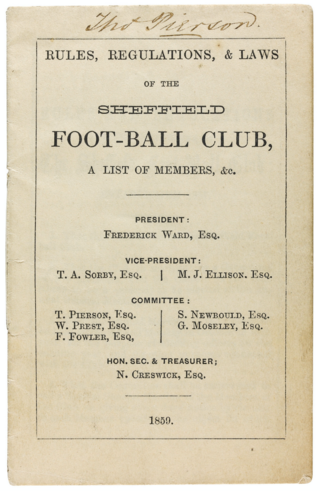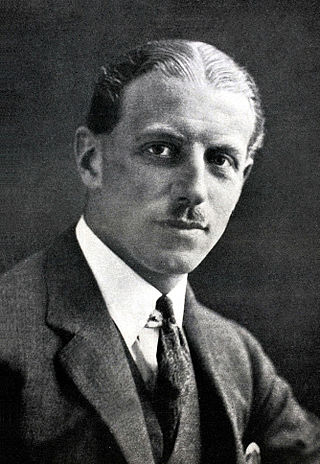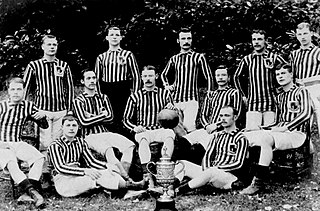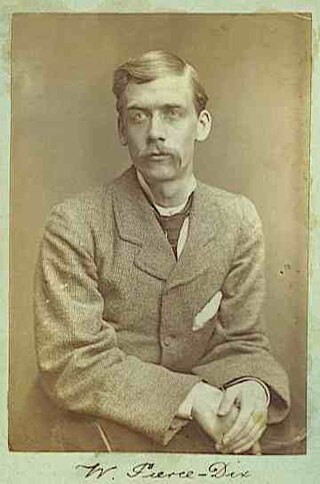Related Research Articles

The Football Association is the governing body of association football in England and the Crown Dependencies of Jersey, Guernsey and the Isle of Man. Formed in 1863, it is the oldest football association in the world and is responsible for overseeing all aspects of the amateur and professional game in its territory.
Wanderers Football Club was an English association football club. It was founded as "Forest Football Club" in 1859 in Leytonstone. In 1864, it changed its name to "Wanderers", a reference to it never having a home stadium, instead playing at various locations in London and the surrounding area. Comprising mainly former pupils of the leading English public schools, Wanderers was one of the dominant teams in the early years of organised football and won the inaugural Football Association Challenge Cup in 1872. The club won the competition five times in total, including three in succession from 1876–78, a feat which has been repeated only once.

Ebenezer Cobb Morley was an English sportsman. He is regarded as one of the fathers of the Football Association (FA) and modern football.

The Sheffield Rules was a code of football devised and played in the English city of Sheffield between 1858 and 1877. The rules were initially created and revised by Sheffield Football Club, with responsibility for the laws passing to the Sheffield Football Association upon that body's creation in 1867. The rules spread beyond the city boundaries to other clubs and associations in the north and midlands of England, making them one of the most popular forms of football during the 1860s and 1870s.

Maxwell "Max" Woosnam was a British sportsman who is sometimes referred to as the 'Greatest British sportsman' in recognition of his achievements.

Charles William Alcock was an English sportsman, administrator, author and editor. He was a major instigator in the development of both international football and cricket, as well as being the creator of the FA Cup.
The West Ham Charity Cup was an annual amateur football tournament which was contested by teams from West Ham and the surrounding area, an area of Essex that is now part of London. Only players that lived locally were eligible to compete. The competition was founded as the West Ham Hospital Cup in 1885 by George Hay, Mayor of the County Borough of West Ham, to raise funds for the local hospital, and ran until 1931.

Colin Campbell Watson was an Australian rules footballer in the Victorian Football League.
The Sporting Life was a British newspaper published from 1859 until 1998, best known for its coverage of horse racing and greyhound racing. Latterly it has continued as a multi-sports website.
Upton Park Football Club was an amateur football club from Upton Park, London in the late 19th and early 20th century, now defunct. As well as being one of the fifteen teams that played in the inaugural FA Cup in 1871, they also represented Great Britain at the first ever Olympic football tournament in 1900, which they won.
Crystal Palace F.C. was an amateur football club formed in 1861 who contributed to the development of association football during its formative years. They were founder members of the Football Association in 1863, and competed in the first ever FA Cup competition in 1871–72.

N.N. Club or N.N. Kilburn—N.N. standing for "No Names" —was an amateur English football club based in the Kilburn district of London. The poor state of the club's original ground led to them being nicknamed the Mudlarks.
Camberwell Football Club was an Australian rules football club which formed around the mid-1880s, with a published match in 1886 and competed in the Victorian Football Association (VFA) between 1926 and 1990. Nicknamed the Cobras, Camberwell wore blue, white and red club colours. They were based in the Melbourne suburb of Camberwell.

Arthur Pember was a British sportsman, stockbroker, lawyer, journalist and author, notable for serving as the first president of The Football Association from 1863 to 1867.

Pat O'Keeffe, was a professional English boxer who became the British champion in both the welterweight and middleweight weight classes. His professional career spanned the years between 1902 and 1918. In 1914 he made an unsuccessful bid for the European heavyweight belt, losing to Georges Carpentier. Between 1907 and 1910 he left Britain and continued his boxing career in the United States, and then Australia. On the outbreak of World War I he joined the British Army to work as a Physical Training Instructor (PTI) and Recruiting Sergeant for the 1st Surrey Rifles. He won the Lonsdale Belt outright when he defeated Bandsman Blake at the National Sporting Club (N.S.C) on 28 January 1918, becoming British Middleweight Champion.

The match between Aston Villa and Hibernian was an exhibition football match that took place in the city of Birmingham in April 1887. It was a return match from a friendly played between the sides in January 1887.
The Sport was a newspaper published in Adelaide between April 1911 and October 1948, which apart from articles on racing, football, cricket, and boxing, carried items of general interest, satire and political comment.
Barnes Football Club is an association football club in Barnes, London. The club had great importance in the development of the game in the nineteenth century and was the first team ever to win a match in the FA Cup.

William Peirce Dix was a British sports administrator, accountant, stockbroker, and political operative.
Robert George Graham was a British sportsman and businessman.
References
- ↑ Brake, Laurel; Denmoor, Marysa, eds. (2009). Dictionary of Nineteenth-Century Journalism: In Great Britain and Ireland. Academia. p. 595. ISBN 978-0712350396 . Retrieved 6 April 2021.
- ↑ "To our readers" . The Sportsman. No. 17, 237. 22 November 1924. p. 7 – via British Newspaper Archive.
- ↑ Curry, Graham (2020). The Making of Association Football: Two Decades Which Created the Modern Game. pp. 105–106. ISBN 978-1527560772.